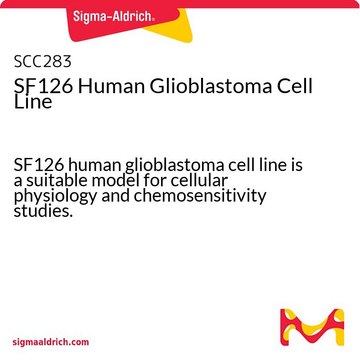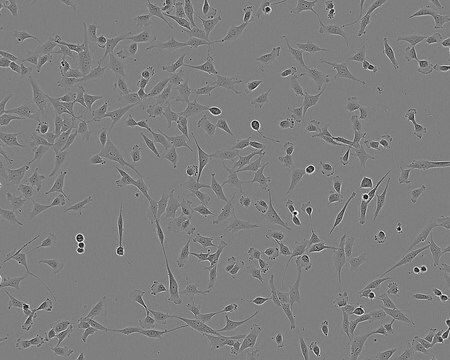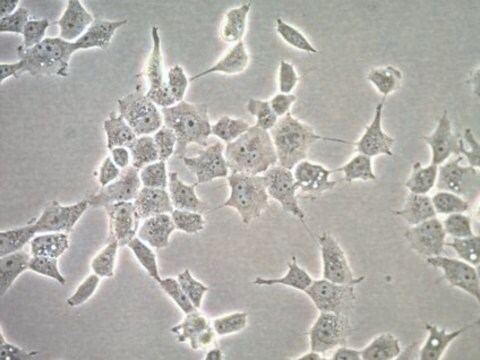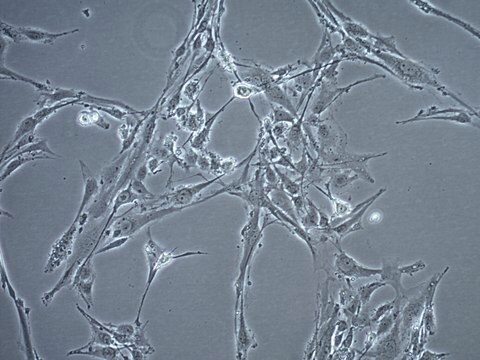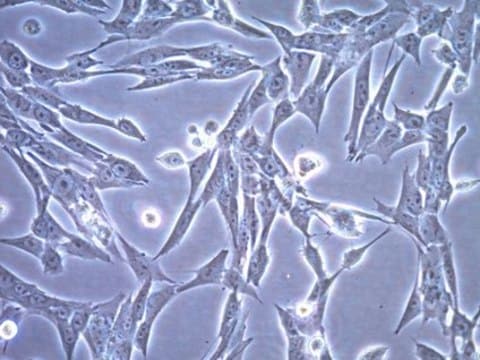SCC289
Ludzka linia komórkowa glejaka SF295
SF295 human glioblastoma cell line is a valuable model for glioblastoma research.
Zaloguj sięWyświetlanie cen organizacyjnych i kontraktowych
About This Item
Kod UNSPSC:
41106514
NACRES:
NA.45
Polecane produkty
Zastosowanie
cell analysis
Opis ogólny
Glejak wielopostaciowy (Glioblastoma multiforme) jest najczęstszym i najbardziej złośliwym pierwotnym guzem mózgu u dorosłych, z wysokim wskaźnikiem nawrotów i pięcioletnim wskaźnikiem przeżycia wynoszącym mniej niż 5% (1). Prawie 50% glejaków wywodzi się z płatów czołowych lub skroniowych mózgu (1). Glejaki są najbardziej agresywną formą raka i wykazują wysoki stopień oporności na chemioterapię, co podkreśla znaczenie odpowiednich ludzkich modeli komórkowych pochodzących od pacjentów dla postępu badań nad charakterystyką i leczeniem tej choroby.
SF295 to pochodząca od pacjenta linia komórek glejaka wywodząca się z guza płata skroniowego (2). Komórki SF295 nie wyrażają markerów glejowych GFAP ani syntetazy glutaminy, ale wykazano, że pozytywnie wyrażają neurofibrominę-1, zidentyfikowaną jako jeden z najczęściej zmutowanych czynników w glejaku wielopostaciowym (3). Komórki SF295 wykazują hipertriploidię i morfologię glejopodobną w hodowli i są nienowotworowe u myszy atymicznych (2). Linia komórkowa SF295 jest często wykorzystywana w badaniach nad chemioterapią glejaka wielopostaciowego, stanowiąc cenny model komórkowy do oceny leków i modulatorów molekularnych pod kątem ich wpływu na glejaka wielopostaciowego.
<bold>Źródło:</bold>
Linia komórkowa glejaka wielopostaciowego SF295 została uzyskana z guza lewego płata czołowego 67-letniej pacjentki (2).
Kategoria badawcza:
Nowotwór
SF295 to pochodząca od pacjenta linia komórek glejaka wywodząca się z guza płata skroniowego (2). Komórki SF295 nie wyrażają markerów glejowych GFAP ani syntetazy glutaminy, ale wykazano, że pozytywnie wyrażają neurofibrominę-1, zidentyfikowaną jako jeden z najczęściej zmutowanych czynników w glejaku wielopostaciowym (3). Komórki SF295 wykazują hipertriploidię i morfologię glejopodobną w hodowli i są nienowotworowe u myszy atymicznych (2). Linia komórkowa SF295 jest często wykorzystywana w badaniach nad chemioterapią glejaka wielopostaciowego, stanowiąc cenny model komórkowy do oceny leków i modulatorów molekularnych pod kątem ich wpływu na glejaka wielopostaciowego.
<bold>Źródło:</bold>
Linia komórkowa glejaka wielopostaciowego SF295 została uzyskana z guza lewego płata czołowego 67-letniej pacjentki (2).
Kategoria badawcza:
Nowotwór
Pochodzenie linii komórkowej
Człowiek, komórki nowotworowe
Opakowanie
1X106 komórek/fiolkę
Przechowywanie i stabilność
Przechowywać w ciekłym azocie. Komórki mogą być hodowane przez co najmniej 10 pasaży po wstępnym rozmrożeniu bez znaczącego wpływu na ekspresję markerów komórkowych i ich funkcjonalność.
Inne uwagi
Niniejszy produkt jest przeznaczony do sprzedaży i sprzedawany wyłącznie instytucjom akademickim do wewnętrznego użytku akademickiego zgodnie z warunkami "Umowy o użytkowaniu akademickim", jak wyszczególniono w dokumentacji produktu. Aby uzyskać informacje na temat innych zastosowań, prosimy o kontakt pod adresem licensing@emdmillipore.com.
Oświadczenie o zrzeczeniu się odpowiedzialności
O ile nie określono inaczej w naszym katalogu lub innej dokumentacji firmy dołączonej do produktu(-ów), nasze produkty są przeznaczone wyłącznie do użytku badawczego i nie mogą być wykorzystywane do żadnych innych celów, w tym między innymi do nieautoryzowanych zastosowań komercyjnych, zastosowań diagnostycznych in vitro, zastosowań terapeutycznych ex vivo lub in vivo lub jakiegokolwiek rodzaju konsumpcji lub zastosowania u ludzi lub zwierząt.
Ta strona może zawierać tekst przetłumaczony maszynowo.
Kod klasy składowania
10 - Combustible liquids
Klasa zagrożenia wodnego (WGK)
WGK 1
Temperatura zapłonu (°F)
212.0 °F
Temperatura zapłonu (°C)
100 °C
Certyfikaty analizy (CoA)
Poszukaj Certyfikaty analizy (CoA), wpisując numer partii/serii produktów. Numery serii i partii można znaleźć na etykiecie produktu po słowach „seria” lub „partia”.
Masz już ten produkt?
Dokumenty związane z niedawno zakupionymi produktami zostały zamieszczone w Bibliotece dokumentów.
Nasz zespół naukowców ma doświadczenie we wszystkich obszarach badań, w tym w naukach przyrodniczych, materiałoznawstwie, syntezie chemicznej, chromatografii, analityce i wielu innych dziedzinach.
Skontaktuj się z zespołem ds. pomocy technicznej